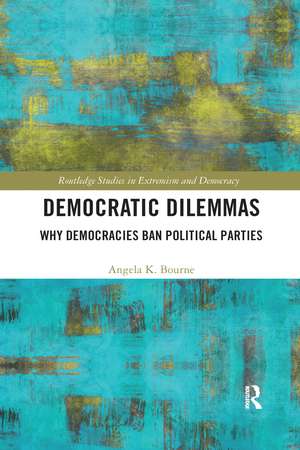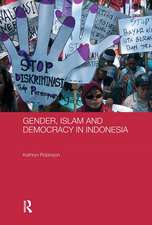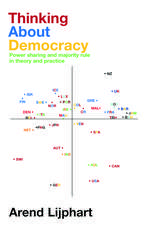Democratic Dilemmas: Why democracies ban political parties: Routledge Studies in Extremism and Democracy
Autor Angela Bourneen Limba Engleză Paperback – 30 iun 2020
This book examines how democratic communities resolve dilemmas posed by anti-system parties or, more specifically, the question of why democracies take the grave decision to ban political parties. On the one hand, party bans may 'protect' democracies, usually from groups deemed to undermine the democratic system or its core values, territorial integrity or state security. At the same time, banning parties challenges foundational democratic commitments to political pluralism, tolerance and rights to free speech and association. The book probes the deliberative processes, discursive strategies and power politics employed when democratic communities negotiate this dilemma. It examines discourses of securitization and desecuritization, preferences of veto-players, anti-system party orientations to violence, electoral systems and the cordon sanitaire as alternatives to party bans, and incentives for mainstream parties to cooperate, rather than ban, parties to achieve office and policy goals. It does so with reference to case studies of party bans, legalizations and failed ban cases in Spain (Herri Batasuna and successors), the United Kingdom (Sinn F in and Republican Clubs) and Germany (Socialist Reich Party and National Democratic Party of Germany).
| Toate formatele și edițiile | Preț | Express |
|---|---|---|
| Paperback (1) | 259.98 lei 6-8 săpt. | |
| Taylor & Francis – 30 iun 2020 | 259.98 lei 6-8 săpt. | |
| Hardback (1) | 1003.43 lei 6-8 săpt. | |
| Taylor & Francis – 26 iul 2018 | 1003.43 lei 6-8 săpt. |
Din seria Routledge Studies in Extremism and Democracy
-
 Preț: 303.83 lei
Preț: 303.83 lei -
 Preț: 349.15 lei
Preț: 349.15 lei -
 Preț: 295.33 lei
Preț: 295.33 lei - 8%
 Preț: 382.08 lei
Preț: 382.08 lei -
 Preț: 198.93 lei
Preț: 198.93 lei -
 Preț: 284.51 lei
Preț: 284.51 lei -
 Preț: 290.39 lei
Preț: 290.39 lei -
 Preț: 301.40 lei
Preț: 301.40 lei -
 Preț: 329.75 lei
Preț: 329.75 lei -
 Preț: 303.14 lei
Preț: 303.14 lei -
 Preț: 348.24 lei
Preț: 348.24 lei -
 Preț: 296.39 lei
Preț: 296.39 lei -
 Preț: 311.41 lei
Preț: 311.41 lei -
 Preț: 386.79 lei
Preț: 386.79 lei - 28%
 Preț: 823.99 lei
Preț: 823.99 lei - 22%
 Preț: 325.96 lei
Preț: 325.96 lei - 18%
 Preț: 1061.57 lei
Preț: 1061.57 lei - 18%
 Preț: 703.79 lei
Preț: 703.79 lei - 18%
 Preț: 1058.65 lei
Preț: 1058.65 lei - 18%
 Preț: 1059.48 lei
Preț: 1059.48 lei -
 Preț: 414.32 lei
Preț: 414.32 lei -
 Preț: 415.67 lei
Preț: 415.67 lei - 18%
 Preț: 1062.62 lei
Preț: 1062.62 lei -
 Preț: 445.38 lei
Preț: 445.38 lei - 18%
 Preț: 1005.80 lei
Preț: 1005.80 lei - 18%
 Preț: 1115.33 lei
Preț: 1115.33 lei -
 Preț: 425.43 lei
Preț: 425.43 lei - 18%
 Preț: 1056.28 lei
Preț: 1056.28 lei - 18%
 Preț: 1109.99 lei
Preț: 1109.99 lei -
 Preț: 481.58 lei
Preț: 481.58 lei - 18%
 Preț: 1054.71 lei
Preț: 1054.71 lei - 18%
 Preț: 699.21 lei
Preț: 699.21 lei - 18%
 Preț: 1000.87 lei
Preț: 1000.87 lei - 26%
 Preț: 821.13 lei
Preț: 821.13 lei -
 Preț: 422.89 lei
Preț: 422.89 lei - 22%
 Preț: 323.72 lei
Preț: 323.72 lei -
 Preț: 375.12 lei
Preț: 375.12 lei - 18%
 Preț: 1181.63 lei
Preț: 1181.63 lei - 18%
 Preț: 1057.13 lei
Preț: 1057.13 lei -
 Preț: 486.42 lei
Preț: 486.42 lei - 18%
 Preț: 1000.45 lei
Preț: 1000.45 lei - 18%
 Preț: 1064.19 lei
Preț: 1064.19 lei - 18%
 Preț: 1057.09 lei
Preț: 1057.09 lei -
 Preț: 488.12 lei
Preț: 488.12 lei
Preț: 259.98 lei
Preț vechi: 311.41 lei
-17% Nou
49.75€ • 52.07$ • 41.41£
Carte tipărită la comandă
Livrare economică 31 martie-14 aprilie
Specificații
ISBN-10: 0367588765
Pagini: 280
Dimensiuni: 156 x 234 x 33 mm
Greutate: 0.45 kg
Ediția:1
Editura: Taylor & Francis
Colecția Routledge
Seria Routledge Studies in Extremism and Democracy
Locul publicării:Oxford, United Kingdom
Public țintă
Postgraduate and UndergraduateCuprins
Notă biografică
Descriere
This book examines how democratic communities resolve dilemmas posed by anti-system parties or, more specifically, the question of why democracies take the grave decision to ban political parties. On the one hand, party bans may 'protect' democracies, usually from groups deemed to undermine the democratic system or its core values, territorial integrity or state security. At the same time, banning parties challenges foundational democratic commitments to political pluralism, tolerance and rights to free speech and association. The book probes the deliberative processes, discursive strategies and power politics employed when democratic communities negotiate this dilemma. It examines discourses of securitization and desecuritization, preferences of veto-players, anti-system party orientations to violence, electoral systems and the cordon sanitaire as alternatives to party bans, and incentives for mainstream parties to cooperate, rather than ban, parties to achieve office and policy goals. It does so with reference to case studies of party bans, legalizations and failed ban cases in Spain (Herri Batasuna and successors), the United Kingdom (Sinn F in and Republican Clubs) and Germany (Socialist Reich Party and National Democratic Party of Germany).


















